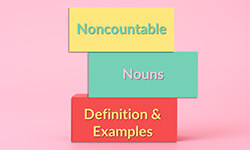
English has many different language rules that need to be considered when writing a text. Many people struggle especially with nouns, that are solely used in singular but sometimes also refer to plural things. Those are called uncountable nouns because they describe something that cannot be counted by numbers. The following article will cover the topic of uncountable nouns and everything you need to know about how to use them correctly.
Definition: Uncountable nouns
In the English language, uncountable nouns are a grammatical category used to describe items that cannot be counted separately or individually. These nouns refer to things that can only be counted or thought of as “wholes”. Uncountable nouns are thus almost always singular, and their number does not affect their plural form. To be grammatically correct, you must use the singular verb form to accompany uncountable nouns. This will ensure that the subject-verb agreement is respected.
Countable nouns vs. uncountable nouns
Countable nouns are those that can be defined through numbers directly. You can say exactly how many of them you are referring to. Uncountable nouns, on the other hand, cannot directly be counted by numbers. However, some uncountable nouns can be countable if referred to as individuals. The following examples will clarify this special case.
| Noun | Type of noun | Examples |
| Experience | Uncountable | I have experience in marketing. (accumulated knowledge) |
| Experience | Countable | I’ve had some cool experiences on my journey. (events) |
| Chicken | Uncountable | I like chicken. (as food or as a species) |
| Chicken | Countable | We raised two chickens. (individuals) |
| Hair | Uncountable | My grandpa doesn't have much hair anymore. (general construct) |
| Hair | Countable | He found two hairs in his soup. (individual hairs) |
There are also cases, where there is a countable equivalent for an uncountable noun. Below you will see some examples to use if your text needs further clarification.
| Uncountable | Countable |
| money | dollar |
| furniture | table, sofa, chair, ... |
| work | job |
| electricity | battery |
| information | report |
| music | song |
| advice | tip |
| luggage | suitcase |
| scenery | view |
| wine, water, juice,... | bottle |
Articles
Uncountable nouns are typically used with the article “the” or no article at all, never use “a/an” for them.
Expression of quantity
Even though you generally cannot count uncountable nouns, you can still define them through measure words or other expressions of quantity. Measure words define the noun by splitting it into countable units, such as cups or bottles for liquids, slices, items, or pieces.
Another way to specify on the quantity of something is through expressions like “much”, “lots of”, “some”, “a little”, “fewer” and other similar words. This way, you can roughly describe the extent of an uncountable noun.
“Research” & “data”
The words “research” and “data” are uncountable nouns, but their use can be especially difficult in academic writing. This is due to some confusion in how these nouns are used.
For example, the word “research” is sometimes pluralized as “researches”. Although the term “researches” exists, it does not indicate plural form, but it is the third-person singular conjugation of the verb “to research” (he/she/it researches). Similarly, the word “data” can cause confusion whether it is singular or plural.
- ✓ Free express delivery
- ✓ Individual embossing
- ✓ Selection of high-quality bindings
Examples
The following list of nouns includes an overview of the most common, uncountable nouns you may encounter in daily life or academic writing.
FAQs
Countable nouns refer to items that can be counted individually, whereas uncountable nouns cannot be counted as separate items.
No, only the definite or no article are grammatically correct. It is incorrect to use “a” and “an” with uncountable nouns.
Some nouns can be used in both ways. The context will determine whether a noun can be countable or not. An example for a noun like this would be “experience”. If it is used in the context of accumulated knowledge, telling someone you have experience in a certain field of work, it is uncountable. If, on the other hand, you refer to specific events as “experiences”, you can count them.
With uncountable nouns, you always have to use the singular verb form.
